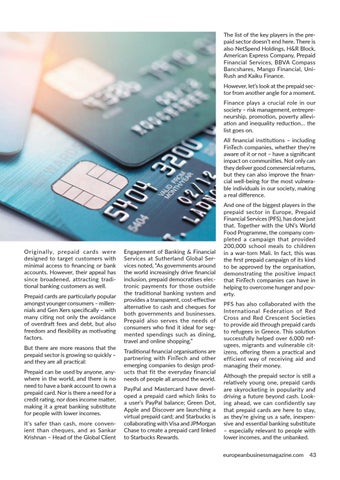The list of the key players in the prepaid sector doesn’t end here. There is also NetSpend Holdings, H&R Block, American Express Company, Prepaid Financial Services, BBVA Compass Bancshares, Mango Financial, UniRush and Kaiku Finance. However, let’s look at the prepaid sector from another angle for a moment. Finance plays a crucial role in our society – risk management, entrepreneurship, promo on, poverty allevia on and inequality reduc on… the list goes on. All financial ins tu ons – including FinTech companies, whether they’re aware of it or not – have a significant impact on communi es. Not only can they deliver good commercial returns, but they can also improve the financial well-being for the most vulnerable individuals in our society, making a real difference.
Originally, prepaid cards were designed to target customers with minimal access to financing or bank accounts. However, their appeal has since broadened, attracting tradional banking customers as well. Prepaid cards are par cularly popular amongst younger consumers – millennials and Gen Xers specifically – with many ci ng not only the avoidance of overdra fees and debt, but also freedom and flexibility as mo va ng factors. But there are more reasons that the prepaid sector is growing so quickly – and they are all prac cal: Prepaid can be used by anyone, anywhere in the world, and there is no need to have a bank account to own a prepaid card. Nor is there a need for a credit ra ng, nor does income ma er, making it a great banking subs tute for people with lower incomes. It’s safer than cash, more convenient than cheques, and as Sankar Krishnan – Head of the Global Client
Engagement of Banking & Financial Services at Sutherland Global Services noted, “As governments around the world increasingly drive financial inclusion, prepaid democra ses electronic payments for those outside the tradi onal banking system and provides a transparent, cost-effec ve alterna ve to cash and cheques for both governments and businesses. Prepaid also serves the needs of consumers who find it ideal for segmented spendings such as dining, travel and online shopping.” Tradi onal financial organisa ons are partnering with FinTech and other emerging companies to design products that fit the everyday financial needs of people all around the world. PayPal and Mastercard have developed a prepaid card which links to a user’s PayPal balance; Green Dot, Apple and Discover are launching a virtual prepaid card; and Starbucks is collabora ng with Visa and JPMorgan Chase to create a prepaid card linked to Starbucks Rewards.
And one of the biggest players in the prepaid sector in Europe, Prepaid Financial Services (PFS), has done just that. Together with the UN’s World Food Programme, the company completed a campaign that provided 200,000 school meals to children in a war-torn Mali. In fact, this was the first prepaid campaign of its kind to be approved by the organisa on, demonstrating the positive impact that FinTech companies can have in helping to overcome hunger and poverty. PFS has also collaborated with the International Federation of Red Cross and Red Crescent Societies to provide aid through prepaid cards to refugees in Greece. This solu on successfully helped over 6,000 refugees, migrants and vulnerable citizens, offering them a prac cal and efficient way of receiving aid and managing their money. Although the prepaid sector is s ll a rela vely young one, prepaid cards are skyrocketing in popularity and driving a future beyond cash. Looking ahead, we can confidently say that prepaid cards are here to stay, as they’re giving us a safe, inexpensive and essen al banking subs tute – especially relevant to people with lower incomes, and the unbanked. europeanbusinessmagazine.com
43
